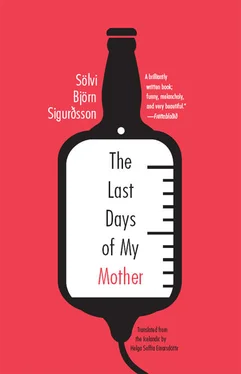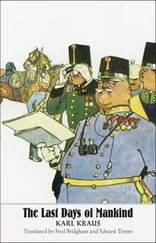Daniel’s presence and his motor mouth seemed to be driving Mother off the deep end; she was tense enough from having to wait for her drink. I decided it was best to agree to everything he said, so I pretended to accept his offer and thanked him. Told him we’d be in touch. Clumsy gangsta -handshake.
“What a creepy man,” Mother said when he was gone. “Fidgeting about like that and going on and on about himself without so much as offering a lady a drink.”
“I’ll take care of it. I’ll get us something strong from the bar.”
When I returned with a selection of tequila shots, one of the racists had taken a seat next to Mother and seemed to be admiring her earlobes. I found it perverse that a man would try to pick up elderly ladies by complimenting their earlobes and quickly drove him away. It was time to call it a night. We downed the shots, stood up and walked out into the night. A polka-dotted Amsterdam shimmered under the summer sky, the artificially lit darkness ready to gobble up the day and pave the way for the underworld. People shouted profanities at lampposts and threw beer cans, the atmosphere was intoxicated, and there was no Ramji to lead the way. I was about to chase down a cab when the bulky Indian with the turban came running, grabbed me, and stared at me with eyes full of spite.
“I saw where you were,” he shouted. “I saw where you are coming from. Racists!”
I couldn’t say anything. After all, I had just come from a gathering of racists.
“You people are a plague on the planet, you are human feces. Feces!
He let go of me and walked off.
“What a brute,” Mother said, insulted by this outburst. “What on earth was he thinking?”
“It’s what happens when you go to a Nazi ball. It’s time to go home.”
We caught a cab to the hotel, where I made us a long drink while she laid out her tarot cards. She was sorry to tell me that the chances of me finding a woman in the near future were very slim indeed and that I should expect hard times financially as the year wore on. Things looked good in the long run, though.
“But now it’s my turn,” she said and lit up as she always did when expecting a prophesy. “I’m sure that my luck is about to change for the better.”
She picked nine cards from the deck and they were all as expected: some difficulties, then tranquility, stability, new feelings and finally. .
“There he is again!”
“Who?”
“The knight, of course!” Excited, she stuck the card in my face. A regal looking man in a kilt riding across clouds under a golden sunset. “What does this mean, Trooper? Will I meet the knight in the kilt?”
I couldn’t help but wonder now and again whether our trip was something more than one big question about the quintessential issues: a whole tarot tournament on life, death, and love, and whether the answer in the end would be anything more than a hollow, intangible sound fading into silence. The fact was that I would in all probability have many decades to ponder the so-called big questions, half a lifetime left for anxiety, nostalgia, and self-doubt, while life was slipping further away from Mother with each passing day.
The absoluteness of this fact hit me now and again like cold slush to the face. I suppose all journeys are melancholy because they encapsulate things that can never be repeated, but my trip with Mother was especially so: a rambling journey to the end of the line. When we weren’t strolling alongside the canals or relaxing slightly tipsy at the hotel — Mother on her balcony with her newly developed yoga program and me in my room, engulfed in the possibilities of the TV remote — I would often think about how lonely she must be, and how harsh it was to have to face Death and watch him rob you of all that never came to be.
Deep down I was unsure that she would get better on Dr. Fred’s Ukrain. The reason was not only that medical science had given us other options, but also that the odds were against us. We hadn’t come all this way to ensure the progression of life, but death was just one of the many possibilities framing our journey, not a player in our revelry. Mother was here because she had no other choice and I was simply here to do the impossible: to make her happy for the last days of her life.
I was haunted on a regular basis by self-doubt regarding the task. I suspected that however hard I tried, the adventure would never fully be realized while we spent our days aimlessly roaming the city. We drank our morning cup of coffee on the balcony and visited museums and galleries before returning to the hotel to continue our session of specials from the night before. Mother sang Nina Simone songs and told anecdotes of drives in the country and a lost bottle of booze in the woods. Stories from the past became stories of the near future.
But no matter how well I performed I was never more than a stand-in for the guy who’s role this should have been. The obvious fact was that Mother needed a lover. Despite an operatic temperament and extraordinary physical strength, she had always been a vulnerable woman and longed to rest in the arms of someone stronger. This had always puzzled me, especially given her incredibly firm opinions on how I lived my own life. She had waited for the solution for years, something that would finally bring her to smooth sailing.
Where this deep longing came from, I didn’t know. Through the years she had blossomed in various parallel dimensions, marriages to deans, socializing with royalty, and an intimate friendship with the Danish TV characters, Nikolaj and Julie, whom she met every now and again according to this alternative reality in the restaurant Skindbuksen in Copenhagen along with her husband, Peter Toft Jensen. It was enough to see Mother at karaoke in her dancing shoes to realize that her dreams were a stark contrast to what really made her happy. But that had no effect on the conclusion: she wanted a man. I’d dreaded this from the beginning and hoped that the issue would be resolved without my help. That we’d meet some former headmaster at a gallery, preferably also suffering from some terminal disease and, after that, Mother would float along on her happy cloud while I’d try some hunting of my own in the bars, like a lion in the jungle of love. But that was not in the cards. Managing the drugs and their effects and nuances was child’s play compared to the impenetrable wall that I now faced, to help Mother fall in love for the last time. I finally decided to send in a personal ad to three respectable cultural publications: Opera Nieuws, Bibliotheek en Boekhandelaar , and an evening paper that allegedly no one but old socialists picked up. The ad read:
Elegant woman in early sixties looking for gentleman of similar age for conversation, dining, museums, theater & concerts. Reply in English with photo and phone no. P.O. Box 3149 in main post office Radhuisstraat & Singel bf. June 1 st .
I felt it was necessary to underline the word “photo” because Mother was vain when it came to the looks of her lovers. She loathed short men and spoke in condescending tones about those who’d fallen like single socks out of washing machines. She would go into graphic detail when describing the various physical qualities she admired in men: broad shoulders, strong features, and a Buddha-belly. She had an aversion to thin men and felt the same way about the obese. She didn’t mind if a man wasn’t handsome as long as he had enough charm to make up for it. Certain primitiveness in the facial features could flatter a man if the eyes radiated intelligence and the jawline suggested daring. She despised sentimental types, but appreciated kindness. In fact, Mother didn’t want a man, she wanted a he-male, and she was ready to forgive the most severe personality flaws, such as serious drinking problems and insanity, if men had that certain masculinity she desired. This had more often than not been her downfall, and I was determined to keep the swashbuckling drunks at bay. The choice of the he-male was most important of all, the final brush stroke in this work of art.
Читать дальше












